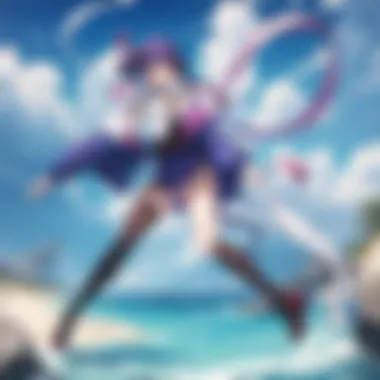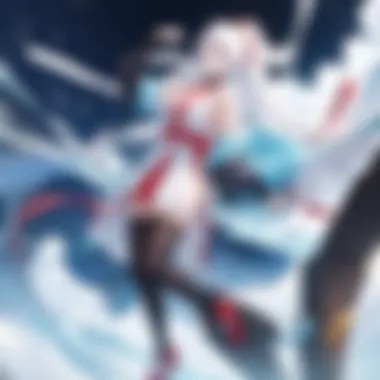Exploring Ore Monogatari: A Unique Anime Experience


Intro
'Ore Monogatari' presents a distinctive approach to the romantic anime genre. Unlike traditional narratives focused heavily on appeal, this series explores themes of love and friendship through unique storytelling and character dynamics. This exploration will examine key aspects of the series, including its narrative structure and the cultural context that informs its success. The juxtaposition of diverse character arcs and the overarching messages invites viewers to reflect on both personal and societal ideals surrounding love.
Featured Series or Manga
Overview of the Series
'Ore Monogatari', also known as 'My Love Story!!', originated as a manga crafted by Kazune Kawahara. It made a smooth transition to anime, aired on various platforms, including Netflix. The series follows Takeo Gouda, an unconventional and oversized high school student with a heart of gold. His journey through high school romance and friendships alongside his kind-hearted friends provides a refreshing lens on the challenges of adolescence.
Key Characters and Development
Central to the series is Takeo Gouda, whose physical appearance often leads to misconceived perceptions. He is complemented by his best friend, Rinko Yamato, whose presence helps to humanize him and contrasts with traditional portrayals of love interests in anime. The two share an innocent yet profound connection that evolves throughout the series, demonstrating character growth and development that is emotionally resonant.
Character Analysis
Major Characters
- Takeo Gouda: The protagonist, epitomizes sincerity and loyalty, standing out in his quest for love. His size highlights the often shallow perceptions of beauty in societal norms.
- Rinko Yamato: Takeo's love interest, represents kindness and understanding, vital for their relationship's growth. Her journey reflects an internal struggle with self-acceptance and unconditional love.
- Makoto Sunakawa: Takeo’s best friend, often overlooked due to his reserved nature, he forms a crucial element in the narrative by balancing the story’s emotional weight. His character development offers insights into the complexities of friendship.
Character Arcs and Growth
The arcs of these characters delve deeper into not only romantic developments but also personal growth. Takeo's journey reveals his struggles with self-image and acceptance in a world that often judges based on appearances. Rinko's character growth embodies the challenge of defining one’s identity amidst complex social expectations. Throughout the series, these characters evolve, allowing for organic relationships that defy typical tropes.
Thematic Exploration
Main Themes and Messages
'Ore Monogatari' touches on themes such as love, acceptance, and friendship. Its narrative challenges traditional notions of beauty, presenting an alternate view on romance that emphasizes emotional connection over physical appearances. Family dynamics and the support of friends play crucial roles, elevating the plot by intertwining personal growth and collective experiences.
Cultural Context and Influences
The series draws from societal norms found within Japan's anime culture, where beauty standards often skew towards the idealized. It critiques these standards, presenting characters with flaws and showcasing genuine emotional connections. In this cultural landscape, the show stands as an influential piece in redefining narratives around romance and friendship, resonating with audiences both in Japan and globally.
"Ore Monogatari redefines romance, shifting the focus from superficial traits to deeper emotional bonds."
Preamble to Ore Monogatari
This section serves as a gateway into the intriguing world of Ore Monogatari. Understanding this anime's title, themes, and narrative structure is crucial. Ore Monogatari differs from typical romantic narratives found in anime. It emphasizes character interaction, exploring relationships in a meaningful way. This foundation sets the stage for an in-depth discussion of its characters and themes later in the article.
Understanding the Title
The title, Ore Monogatari, translates to "My Story". This choice reflects protagonist Takeo Goda's personal journey. Unlike conventional romantic leads, Takeo is a giant, physically imposing young man. His appearance contrasts sharply with the typical slim, appealing characters usually found in romantic anime. By naming the series after him, it underscores a primary theme: the exploration of individuality and non-conformity. While Takeo's friends may experience their own issues, the title indicates a personal narrative that revolves around his unique experiences.
A Brief Synopsis of the Series
Ore Monogatari follows Takeo, whose formidable size often intimidates others. He does not fit the mold of a typical romantic lead, but this is where the series shines. Rinko Yamato, a petite and sweet girl, finds herself drawn to Takeo despite his appearance. This unlikely pairing challenges traditional romance tropes, creating a fresh narrative. The story unfolds around their evolving relationship, focusing on themes of loyalty, love, and friendship.


The plot invites viewers to appreciate the subtleties of relationships beyond superficial attraction. Through Takeo's interactions with Rinko and his best friend, Sunakawa, viewers gain insights into the complexities of love and friendship. Each episode delves into their experiences, making it clear that the show is not merely about romantic interest. It is a relatable tale about finding acceptance and understanding, which resonates with a broad audience.
In summary, Ore Monogatari offers a unique perspective on relationships. It invites viewers to reflect on the nature of love and self-acceptance, a necessary contemplation in today's world.
The Main Characters of Ore Monogatari
The character dynamics in Ore Monogatari play a crucial role in where the series finds its heart. Characters are not just vehicles for the plot; they embody the themes and ideals that resonate with the audience. Through their experiences and interactions, viewers gain insight into varied dimensions of growth, romance, and companionship. This section will dissect the central characters, illustrating how they contribute to the larger narrative and themes of the series.
Takeo Goda: A Non-Traditional Protagonist
Takeo Goda stands out in the realm of anime protagonists. He embodies a kind-hearted yet misunderstood character. Unlike typical leading men who are often portrayed as charming or suave, Takeo is more robust and less conventionally attractive. This distinctiveness makes him relatable, especially for those who may not fit the stereotypical mold of beauty.
His journey is about self-acceptance. Takeo's large stature and intimidating presence often lead others to misjudge him. However, his gentle nature challenges preconceptions about masculinity and romance. In a world often driven by aesthetics, Takeo's story offers a refreshing perspective. His experiences resonate with many viewers, speaking to the idea that personal worth is not confined to physical appearance.
Rinko Yamato: The Romantic Interest
Rinko Yamato serves as the romantic interest, creating an interesting foil to Takeo's character. She is a petite and charming girl who shares a deep connection with Takeo. Rinko's character is not just a typical love interest; she displays agency and depth that enrich her relationship with Takeo.
Her admiration for Takeo is a powerful aspect of the storyline. It transcends societal norms, emphasizing that love can arise from unexpected places. Rinko's attraction to Takeo highlights the importance of personality over appearance. Through her character, the show presents a nuanced view on love, allowing viewers to reconsider superficial judgments about relationships.
Sunakawa: The Best Friend Dynamic
Sunakawa plays the critical role of Takeo's best friend. His calm demeanor contrasts sharply with Takeo's exuberance. This friendship is fundamental to the narrative because it shows loyalty and support. Sunakawa often finds himself in a mediator role, guiding Takeo through the complexities of his romantic life.
Despite being seen as the more traditionally attractive friend, Sunakawa does not pursue romantic attention for himself, which underlines the loyalty he feels toward Takeo. His character serves to challenge the expectations placed on male friendships within the anime genre, showcasing a bond that is both supportive and empowering.
"In Ore Monogatari, the complexities of friendship, love, and self-acceptance are navigated through well-crafted characters that resonate with the audience across diverse backgrounds."
These characters are richly detailed, each contributing unique perspectives on the romantic themes at play. Through their interactions, Ore Monogatari creates a nuanced representation of love that is grounded in realism and relatability.
Themes Explored in the Series
Exploring the themes in Ore Monogatari reveals much about the series. This anime goes beyond surface-level entertainment. It delves into deeper layers of human relationships, societal expectations, and self-discovery. Understanding these themes helps viewers appreciate the complexities and emotional nuances within the narrative. Such exploration can also enlighten viewers about the cultural context that shapes these themes.
Romantic Comedy as a Genre
Ore Monogatari presents a fresh take on the romantic comedy genre. Most rom-coms often follow predictable patterns, featuring handsome protagonists and typical love interests. However, this anime breaks the mold. Takeo Goda, the main character, is not the conventional heartthrob. His large frame and sometimes clumsy demeanor set him apart from traditional leads. The humor in the show comes from his interactions, which often include misunderstandings and comedic situations.
Moreover, the romantic elements are woven into the story with sensitivity. Unlike many rom-coms, Ore Monogatari emphasizes honesty and communication in relationships. The dynamics between Takeo and Rinko Yamato offer a refreshing perspective. The gentle approach to romance distinguishes this anime. It explores the idea that love can blossom in unexpected places.
Friendship and Loyalty
Friendship plays a crucial role in Ore Monogatari. The bond between Takeo Goda and his best friend, Makoto Sunakawa, adds depth to the story. Their friendship is characterized by support and loyalty. Sunakawa consistently encourages Takeo, showing how friendship can be a foundation for personal growth. This theme emphasizes the importance of having a support system in navigating life's challenges.
Moreover, Sunakawa’s character adds another layer to the narrative. He embodies the ideals of loyalty and selflessness. His willingness to step aside for Takeo's happiness reflects the essence of true friendship. This portrayal of loyalty resonates with audiences, as it highlights the often-overlooked aspects of friendships in romantic stories.
Self-Acceptance and Personal Growth
Ore Monogatari also delves into self-acceptance and personal growth. Takeo's journey is symbolic of many struggles people face. Through his character development, viewers witness the evolution from insecurity to confidence. Takeo learns to embrace his uniqueness, which is a central message of the anime.


The series illustrates how acceptance can lead to healthy relationships, both with oneself and others. For instance, Rinko Yamato's unwavering affection for Takeo reinforces the idea that love can be unconditional. This message encourages viewers to appreciate their intrinsic value. Furthermore, it illustrates that personal growth often stems from understanding and accepting oneself. This thematic exploration is a vital aspect of the series that resonates deeply with its audience.
"In essence, Ore Monogatari celebrates the complexities of love, friendship, and self-discovery, making it an enriching watch for anyone seeking meaning in relationships."
Overall, these themes create a rich tapestry that enhances the viewing experience. Each element plays a significant role in how the story unfolds, providing layers of meaning that engage, inspire, and provoke thought among viewers.
Cultural Context of Ore Monogatari
Understanding the cultural context of Ore Monogatari enriches the experience for viewers. It provides insights into the societal norms and values that shape the characters and their interactions. This series is steeped in cultural nuances that reflect Japanese romantic ideals and the depiction of masculinity. Awareness of these elements can enhance one’s appreciation of the story and its themes.
Japanese Romantic Ideals
Japanese romantic ideals are essential to grasp when exploring Ore Monogatari. The show emphasizes the importance of sincerity, emotional depth, and the gradual development of relationships. Rather than rushing into romance, characters take time to understand each other. This reflects a broader cultural tendency in Japan to prioritize emotional connections over mere physical attraction.
In many scenes, the characters express their feelings quietly, often through gestures rather than words. This subtlety can be seen in Takeo's relationship with Rinko. Their moments together are often intimate yet reserved, showcasing their growing affection without overt displays. This approach to romance underlines values like patience and respect, resonating deeply with viewers who appreciate character-driven storytelling.
Moreover, the series highlights the significance of friendship as a precursor to love, which aligns with traditional Japanese values. Takeo's bond with Sunakawa illustrates this concept well. Their relationship shows that loyalty and support in friendships can provide the foundation for romantic connections.
Depictions of Masculinity
The portrayal of masculinity in Ore Monogatari is also noteworthy. The series presents a nuanced take on what it means to be a man in contemporary Japanese society. Takeo Goda is not the stereotypical strong and confident hero often found in anime. Instead, he embodies an atypical masculinity characterized by sensitivity, kindness, and vulnerability.
This approach offers a refreshing perspective on male identity. It challenges conventional notions of manliness that prioritize aggression or dominance. Takeo's care for Rinko and his strong bond with Sunakawa reflect a new narrative in anime, one that embraces emotional intelligence rather than traditional masculinity traits.
This redefinition invites discussions about the evolving cultural landscape in Japan, where modern men are increasingly encouraged to express their emotions and embrace their vulnerabilities. By depicting Takeo in this light, Ore Monogatari helps to dismantle harmful stereotypes, and presents a more well-rounded view of masculinity that resonates with many viewers.
Reception and Impact on Audience
Understanding the reception and impact of Ore Monogatari is essential for grasping its significance within the anime landscape. The show has not only attracted a dedicated fan base but has also sparked discussions about its unique approach to romantic themes. Analyzing critics' reviews helps to shed light on how well it was received in the industry while also framing audience feedback can provide insights into its cultural relevance.
Critics' Reviews
Critics praise Ore Monogatari for its refreshing take on romance. Reviewers have noted that the series deviates from typical romantic anime tropes, focusing on genuine character development rather than exaggerated scenarios. This shift was particularly well-received as it offers a more relatable and nuanced perspective on relationships. For instance, several critics have highlighted the realistic portrayals of both the protagonists, Takeo Goda and Rinko Yamato, as a strong point in the series. Such authenticity allows viewers to engage more deeply with the narrative.
"In a genre often dominated by clichés, Ore Monogatari manages to carve out a unique narrative space that appeals to both casual viewers and anime aficionados."
— Anime Critic Review 2023
Moreover, the series's animation quality is praised, especially in how it captures emotional moments. The attention to detail in character expressions enhances the viewing experience, making the romance feel more impactful. Overall, critics have lauded the exploration of friendship and romance without falling into the trap of melodrama.
Audience Feedback and Shows' Popularity
Audience feedback for Ore Monogatari is overwhelmingly positive. Viewers appreciate the relatable characterizations and the balanced pacing of the story. Takeo’s character, often perceived as unconventional, resonates with many who have felt like the underdog in romantic pursuits. This relatability contributes to a strong emotional connection with the audience.
The show has gained significant popularity on platforms like Netflix, leading to discussions on forums such as Reddit about its narrative and thematic depth. Fans often express their enjoyment of the warmth and humor embedded in the story, indicating a strong connection to its overall message about love and acceptance.
Key elements contributing to the show's popularity include:
- Character Depth: Characters are well-rounded and multifaceted.
- Unique Storyline: The focus on friendship alongside romance sets it apart.
- Quality Animation: High-quality visuals enhance emotional engagement.


In summary, the reception of Ore Monogatari showcases its impact on both critics and viewers. Its ability to foster discussions and create emotional connections reflects the show's lasting significance in the realm of romantic anime.
Comparison with Other Romantic Anime
In examining the landscape of romantic anime, it becomes apparent that Ore Monogatari has carved out a niche that offers both similarities and notable distinctions compared to its contemporaries. This comparison helps to highlight what makes Ore Monogatari unique and relevant within the genre, providing insights into character development, narrative structure, and thematic depth. Understanding these elements enhances the appreciation of the series and its place within the broader category of romantic anime.
Distinct Elements of Ore Monogatari
Ore Monogatari stands apart from traditional romantic anime through key elements, most notably its protagonist, Takeo Goda. Unlike the more common archetype of the handsome yet aloof male lead, Takeo is characterized by his bulk and unrefined charm. His appearance and demeanor challenge the beauty standards typically depicted in anime. Moreover, the dynamics of his relationships, especially with Rinko Yamato, offer Ore Monogatari a refreshing angle on romantic interactions. It emphasizes genuine affection over superficial attraction, encouraging viewers to reconsider their expectations of romantic storytelling.
Another significant aspect is the focus on friendship. The bond between Takeo and his best friend Sunakawa is explored in a way that elevates friendship to an important pillar of the narrative. This element fosters a sense of authenticity that is often overlooked in more conventional romantic settings.
Clichés in Romantic Anime
The realm of romantic anime is often rife with clichés. Common tropes include love triangles, misunderstandings, and over-the-top dramatic moments that can detract from a genuine viewing experience. Ore Monogatari notably avoids many of these familiar paths. While it is not entirely free from trope usage, it presents them in a way that feels organic rather than forced. For instance, the way Takeo's naive misunderstandings occur feels relatable and true to his character, rather than simply serving as a narrative device to create tension.
How It Reinterprets Traditional Tropes
This series reinterprets traditional tropes by placing emphasis on aspects that are often secondary in similar works. For example, the “best friend� role typically exists as a mere plot device, but in Ore Monogatari, Sunakawa's character is developed with depth. His insights and support for Takeo highlight the importance of friendship in romantic pursuits. Additionally, the concept of unrequited love is addressed with sensitivity and realism, allowing viewers to connect with the characters on a more profound level.
Through these distinct elements and reinterpretations, Ore Monogatari not only contributes to the romantic genre but also encourages the re-evaluation of its conventions. This discussion about its differences and similarities provides a richer understanding and appreciation for fans and newcomers alike.
Future of Ore Monogatari
The future of Ore Monogatari holds considerable importance, not just for its narrative continuity but also for the interests of its audience. As a romantic anime, it intersects between traditional tropes and contemporary viewer expectations. Keeping in mind how adaptations evolve, there are multiple aspects to examine.
Potential Developments in Adaptations
Considering the series' popularity, potential developments may include new adaptations or spin-offs, particularly in light of manga or light novel extensions. The original manga, created by Kazune Kawahara, has a wealth of material that has not yet been animated. This situation presents a solid opportunity for the production studios to further explore deeper character backstories or world-building aspects that weren’t fully fleshed out in the original series.
In addition, with the advent of new streaming technologies and formats, there may arise chances for Ore Monogatari to be reimagined for different audiences. For example, micro-series or short episodes could allow for specific character moments to shine, providing fans with content they crave. Additionally, there could be adaptation into formats like live-action television or films, which would broaden its appeal beyond anime enthusiasts.
Fan Theories and Expectations
Fan theories play an intricate role in the future landscape of any series, and Ore Monogatari is no exception. The engaged community surrounding the series often speculates about potential story arcs and character developments. For instance, fans have voiced their hopes for deeper exploration of Sunakawa’s character. They believe a stronger focus on his background and individual journey might not only add richness but also introduce new plot lines that engage viewers further.
Moreover, many are curious about the relationship dynamics between Takeo and Rinko as they evolve through their life stages. Enthusiasts hope to see their challenges addressed in future adaptations, reflecting the realities of young adult relationships.
"Fan engagement is crucial to keep Ore Monogatari relevant and fuels discussions about its future direction."
Therefore, as future adaptations come into play, it is imperative to balance fan expectations with creative storytelling. While the works so far have set a solid foundation, the potential expansions and explorations are vast. Whether through adaptations, spin-offs, or deeper dives into the character arc, the series undoubtedly holds a special place in the anime landscape and will continue to garner attention. Must watch for both new and seasoned anime followers.
End
In considering the overall significance of Ore Monogatari, it is essential to appreciate how the series encapsulates its unique narrative style while exploring profound themes of love, friendship, and self-identity. This anime stands out in the romantic genre for its focus on unconventional characters, offering a fresh perspective amid a sea of typical tropes. By critically engaging with its story structure and character development, many elements become apparent that are deserving of attention.
The exploration of Takeo Goda and his relationship with Rinko Yamato allows the audience not only to witness a romance unfold but also to confront societal expectations regarding masculinity and femininity. This dynamic presents viewers with a holistic view of love that encompasses acceptance and unconditional support.
Final Thoughts on Ore Monogatari
Reflecting on Ore Monogatari, one can identify its impact not merely on its primary audience but also on the broader landscape of romantic anime. It succeeds in showing that love stories do not need to adhere to conventional norms to resonate. The emphasis on friendship, loyalty, and, ultimately, self-acceptance encourage viewers to reconsider their own relationships in the real world.
Moreover, this series provides a canvas for discussions about evolving romantic ideals. As societal norms progress, so too does the portrayal of romance in media, making Ore Monogatari a timely representation worth examining.
In summary, this series is more than just entertaining; it serves as an agent for exploring and understanding diverse perspectives on love and relationships. Through its rich narrative and character interactions, it offers valuable insights that resonate with both anime aficionados and casual viewers alike.



